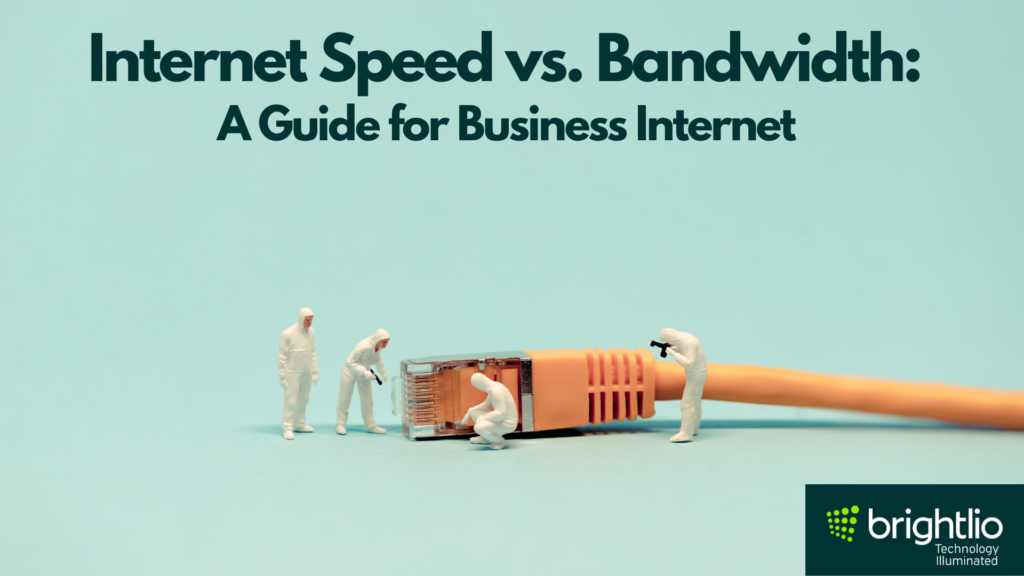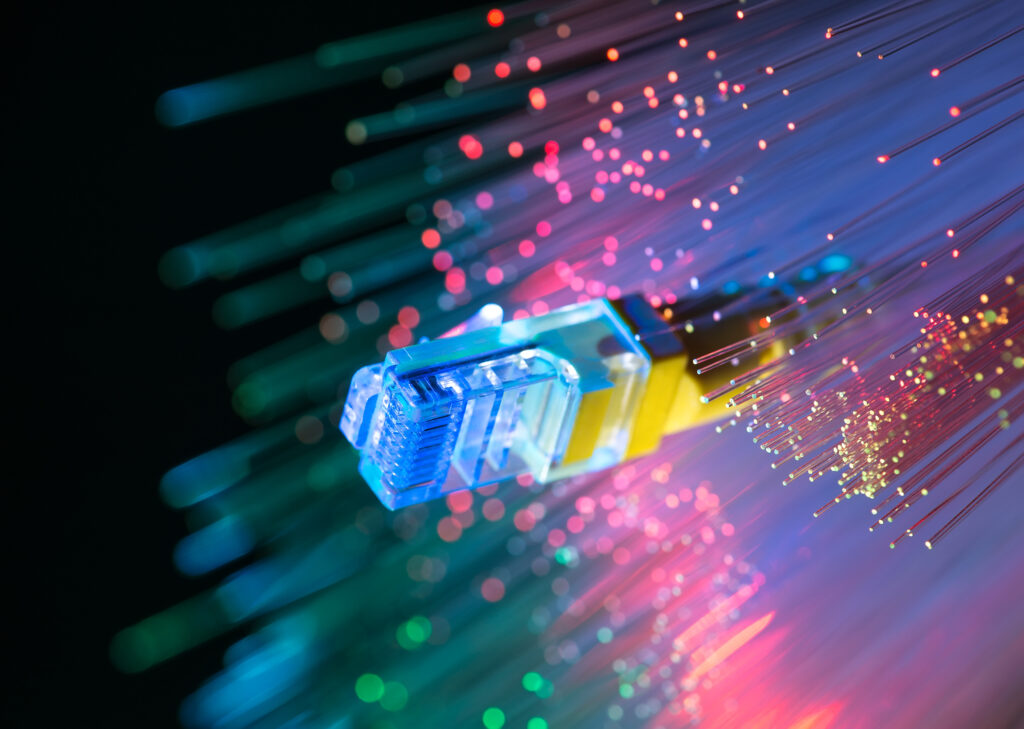
Table of Contents
Internet Speed vs. Bandwidth: A Guide for Business Internet
As we navigate the digital age, businesses increasingly rely on efficient, reliable internet connections to maintain optimal performance. Whether it’s ensuring seamless video conferences, rapid file transfers, or smooth cloud-based operations, the quality of your internet service plays a crucial role in your business’s success. Yet, with many options available and terms like ‘bandwidth’ and ‘speed’ often used interchangeably, making the right choice can seem daunting.
This blog post is here to help you unravel these complexities. We will dissect the critical differences between internet speed vs. bandwidth, delve into the details of various internet options, and highlight the distinguishing factors between broadband and dedicated internet.
Defining Internet Speed
Internet speed is the rate at which data can be transferred between your device and the internet. Connection speed plays a pivotal role in the execution of online tasks, impacting how swiftly you can send and receive data.
Internet speed is typically measured in megabits per second (Mbps) or gigabits per second (Gbps). A higher internet speed leads to faster downloads, uninterrupted video conferencing, and efficient online collaboration – all essential for a thriving business.
Defining Bandwidth
Bandwidth, though often conflated with speed, represents your internet connection’s maximum data transfer capacity. Imagine it as a multi-lane highway, where each lane signifies a certain amount of data that can be transferred simultaneously. Higher bandwidth equates to more data being transmitted simultaneously, which usually results in faster internet speeds. Like speed, bandwidth is also measured in Mbps or Gbps.
Contrasting Internet Speed and Bandwidth
Although speed and bandwidth both contribute to your internet connection’s performance, they are distinctly different concepts. Speed signifies the actual data transfer rate, while bandwidth depicts the maximum potential for data transfer. In simpler terms, speed is how fast data is transmitted, while bandwidth is how much data can be transmitted.

Different Types of Internet Options
Several internet options exist for businesses, with the best choice depending on your requirements, budget, and location. Here are some of the most common options:
Cable
Cable internet utilizes coaxial cables, initially used for cable television, to provide internet access. Generally offering higher speeds than DSL, it is commonly available in urban areas.
Fiber Optic
Fiber optic internet employs thin strands of glass to transmit data using light signals. Though less widely available and potentially more expensive to install, it offers incredibly fast speeds and is ideal for heavy internet usage.
Satellite
Satellite internet leverages a network of satellites orbiting Earth to transmit data. Despite slower speeds and potential latency issues, it is widely available, even in rural areas where other options might be limited.
Fixed Wireless
This option uses radio signals to transmit data between a central access point and your business. It’s a viable option for rural areas with limited wired connection options, though it requires a direct line of sight to the access point.
MPLS (Multi-Protocol Label Switching)
MPLS is a highly reliable and secure internet option that directs data from one network node to another. It’s an excellent choice for businesses that prioritize data security and stability. However, MPLS can be costlier than other options.
Digital Subscriber Line (DSL)
DSL is an older technology that transmits data using your existing phone lines. Its speeds vary depending on factors such as the quality of the phone lines and distance from the exchange. While slower than other options, it’s widely available and can be a cost-effective solution for smaller businesses.
By understanding these different options and working with an experienced telecom broker like Brightlio, you can find the internet solution that fits your business needs like a glove.

Broadband vs. Dedicated Internet
Broadband internet is a high-speed connection that is shared among multiple users. It is the most common internet connection for homes and small businesses. Broadband connections usually cost less but can suffer from slower speeds and reduced reliability during peak usage times.
As the name suggests, Dedicated internet is a dedicated connection reserved exclusively for your business. It offers consistent speeds and improved reliability compared to broadband, as other users’ activity does not affect your connection.
Dedicated internet connections are ideal for businesses with high data demands, such as large file transfers, video conferencing, or hosting servers. However, they are typically more expensive than broadband options.
How Much Bandwidth Do I Need?
Determining the suitable internet bandwidth for your business depends on various factors, including the number of employees, the type of work they perform, and your internet usage. Here are some helpful tips to consider when deciding on the best bandwidth capacity for your needs:
Assess your internet usage: Consider the online activities your business performs daily, such as email, web browsing, file sharing, unified communications, and video conferencing. Remember that tasks like streaming video or uploading large files require more bandwidth.
Estimate the number of concurrent users: Determine how many employees will use the internet simultaneously. As more users connect simultaneously, you’ll need higher bandwidth to ensure everyone has a smooth experience.
Plan for growth: Your internet demands will likely increase as your business expands. Choose a scalable solution that can accommodate your future needs without requiring a significant infrastructure overhaul.
Test your current speed: Use an online speed test to determine your internet speed and compare it to your requirements. If you’re consistently experiencing slow speeds, it may be time to upgrade your bandwidth.
Helpful Tools for Determining Your Bandwidth Needs
Here are a few helpful tools to help you calculate your bandwidth needs and potential costs:
Ookla Speed Test: This is a free, easy-to-use tool that measures your current internet speed. You can determine if it’s time to upgrade your bandwidth by comparing your current speed with your internet usage needs.
One Ring Network’s Bandwidth Calculator: Their tool allows you to enter in the number of users, devices, and types of applications used. It then generates the recommended service and bandwidth you need.
Brightlio Quote Request: Fill out a simple form on our website, and our team will provide you with a free, no-obligation quote for various internet services that fit your specific needs.
These tools can offer valuable insights into your internet situation and help you decide your bandwidth needs. With this information and guidance from Brightlio, you’ll be well-equipped to navigate your business’s digital journey.
How Brightlio Can Help You Choose the Right Bandwidth Option
Brightlio is are a leading telecom broker dedicated to helping businesses find technology solutions that meet their needs and budget. Our team of experts will work with you to assess your requirements and recommend the most suitable bandwidth options from our wide range of providers. And the cherry on top? Our price quotes come with no additional cost to you.
In addition to connectivity solutions, we offer unified communications, colocation, public cloud, and advisory services. We are committed to being your must trusted and responsive IT solutions provider.
Conclusion
As the digital landscape continues to evolve, understanding the nuances of internet speed, bandwidth, and the various connectivity options becomes increasingly essential. By carefully evaluating your business’s unique needs and partnering with experienced professionals like Brightlio, you can ensure that you select the ideal bandwidth solution to fuel your business’s success.
Don’t let slow internet speeds or insufficient bandwidth stand in the way of your company’s growth. Contact Brightlio today to embark on your journey towards a faster, more efficient internet connection.
FAQs
What does network speed refer to in my internet plan?
Network speed, or internet speed, refers to how fast data is transferred between your computer and the internet. It’s usually measured in Mbps (Megabits per second) or Gbps (Gigabits per second).
How is upload speed different from download speed?
Upload speed is how fast data is transferred from your computer to the internet, while download speed is the rate at which data is transferred from the internet to your computer. Most people download more data than they upload, so many internet providers offer plans with faster download speeds.
What does bandwidth refer to?
Bandwidth refers to the maximum amount of data that can be transferred over your internet connection at a given time. The more bandwidth you have, the more data you can transfer at a faster rate, which is crucial when using multiple devices or hosting a video conference.
What can cause connection issues or delay?
Connection issues can be caused by several factors, including insufficient bandwidth, network congestion, or problems with your internet provider’s network.
Who can I contact for support if I have issues with my internet plan?
You should contact your internet provider for any issues with your account. They can help diagnose and troubleshoot any problems you’re experiencing.
Recent Posts
Vancouver Data Centers: Colocation in the Pacific Northwest
Business Broadband Solutions: The Ultimate Guide
Let's start
a new project together



